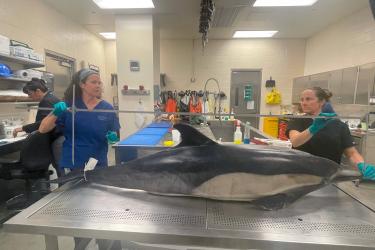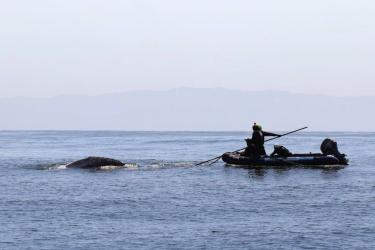U.S. Secretary of Commerce Gina M. Raimondo announced today her determination and the allocation of $17.4 million to address fishery disasters that occurred in multiple tribal salmon fisheries on the West Coast from 2014 to 2019.
“Sustainable and resilient fisheries play a vital role in helping tribal communities put food on the table and in supporting economic well-being,” said Secretary Raimondo. “It’s our hope that this disaster declaration will help the affected tribes recover from these disasters and increase their ability to combat future challenges.”
The Secretary found that the following fisheries met the requirements for a fishery disaster determination:
- 2019 Fraser River & Skagit River Salmon Fisheries (the Swinomish Indian Tribal Community, Tulalip, Upper Skagit Tribes).
- 2015, 2016, 2017, and 2019 Fraser River and Nooksack River Terminal Area Sockeye, Chinook, Chum, Coho and Pink Salmon Fishery (Lummi Nation).
- 2019 Puget Sound Fall Chum Salmon Fishery (Squaxin Island Tribe).
- 2014 and 2019 Fraser River Sockeye and Puget Sound Chum, and Coho Salmon Fishery (Port Gamble S'Klallam Tribe).
- 2019 Klamath River Fall Chinook Salmon Fishery (Yurok Tribe).
The Secretary, working with NOAA Fisheries, evaluates each fishery disaster request based primarily on data submitted by the requesting tribe, state or appointed official. Positive determinations make these fisheries eligible for disaster assistance from NOAA. In order to allocate funding across the eligible disasters, NOAA Fisheries used commercial revenue loss information. The agency also took into consideration traditional uses that cannot be accounted for in commercial revenue loss alone, such as cultural and subsistence uses.
“NOAA has great respect for our tribal fishery co-managers, and their knowledge, science and history are invaluable to our work managing and restoring fisheries,” said Janet Coit, Assistant Administrator for NOAA Fisheries. “With climate change impacts further stressing our fisheries and waterways, it is essential that we work together to take on the challenges in our ecosystems and communities.”
These funds will help improve the long-term economic and environmental sustainability of the impacted fisheries. Funds can be used to assist fisheries participants, including commercial fishermen, charter businesses, shore-side infrastructure providers and subsistence users. Activities that can be considered for funding include fishery-related infrastructure projects, habitat restoration, tribal and fishing permit buybacks, job retraining and more. Some fishery-related businesses impacted by this fishery disaster may also be eligible for assistance from the Small Business Administration.
In the coming months, NOAA Fisheries will work with the tribes receiving allocations under this announcement on administering these disaster relief funds. Fishing communities and individuals affected by these disasters should work with their tribe and/or the Pacific States Marine Fisheries Commission as appropriate.
See the detailed allocations to the tribes under this announcement and learn more about fishery disaster assistance.
Media contact
Katie Wagner, nmfs.pa@noaa.gov, (443) 458-8480

